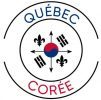Makgeolli « made in Quebec »: Geonbae!
Even in my wildest dreams, I could not imagine that I’d deliver this news : makgeolli made in Quebec is coming! The Vrooden brewery, based in Granby (Quebec) and specializing in German beers, is taking the gamble. Their brand will be named Geonbae (건배) which means “cheers” in Korean and will be available in Quebec starting June 2021.
A long-term project
For a long time, Carol Duplain, president and brewer, had the idea of recreating in Quebec this alcohol made from fermented rice. Before brewing beer, Carol worked as an engineer for a semiconductor company, and his job took him to South Korea several times. It was there that he discovered and tasted this milky-looking alcohol that is served around a good meal. Duplain thought it was a pity for Koreans in Quebec and Quebecers in love with Korea that there was no good makgeolli offered. When he began his new career as a brewer, he thought that he had all the tools at his fingertips to produce it here and offer a rice liquor worthy of those found in South Korea.
What is makgeolli?
When you go to South Korea or eat at a Korean restaurant anywhere in the world, there are usually two popular Korean alcoholic beverages available to you: soju and makgeolli. (Of course, there are other Korean drinks ;-)) Both are derived from processing rice, as makgeolli is the result of the fermentation of rice, and the distillation of makgeolli results in soju.
 I’m no specialist, but its manufacture can be summed up as follows: you have to steam the rice, mix it with water and nuruk, (fermented wheat pancake that acts like yeast by starting the fermentation process using bacteria), and then subjecting the mixture to several fermentation phases until a milky appearance is obtained. It takes an average of 1 month to obtain a final product with an alcoholic strength ranging from 6 to 18 degrees.
I’m no specialist, but its manufacture can be summed up as follows: you have to steam the rice, mix it with water and nuruk, (fermented wheat pancake that acts like yeast by starting the fermentation process using bacteria), and then subjecting the mixture to several fermentation phases until a milky appearance is obtained. It takes an average of 1 month to obtain a final product with an alcoholic strength ranging from 6 to 18 degrees.
 Makgeolli has been around for centuries in South Korea. All the families used to make their own because its preparation does not require specific technical means: just rice, cereals, and water. Even its history is intrinsically linked to the economic and political history of the country. Under the Japanese occupation, « homemade » production was prohibited by the occupier, who wanted to mass-produce it in factories, market it and thus keep all profits. After the Korean War, the country was desperate, food was scarce, so the then-president banned all use of rice in alcohol-making processes. In the 1970s, with the country’s rapid economic development, the Koreans gradually abandoned this alcohol in favor of wine and beer. The makgeolli then became old-fashioned and often associated with the rural world and seniors.
Makgeolli has been around for centuries in South Korea. All the families used to make their own because its preparation does not require specific technical means: just rice, cereals, and water. Even its history is intrinsically linked to the economic and political history of the country. Under the Japanese occupation, « homemade » production was prohibited by the occupier, who wanted to mass-produce it in factories, market it and thus keep all profits. After the Korean War, the country was desperate, food was scarce, so the then-president banned all use of rice in alcohol-making processes. In the 1970s, with the country’s rapid economic development, the Koreans gradually abandoned this alcohol in favor of wine and beer. The makgeolli then became old-fashioned and often associated with the rural world and seniors.
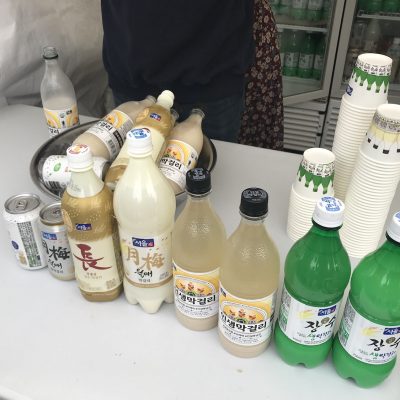
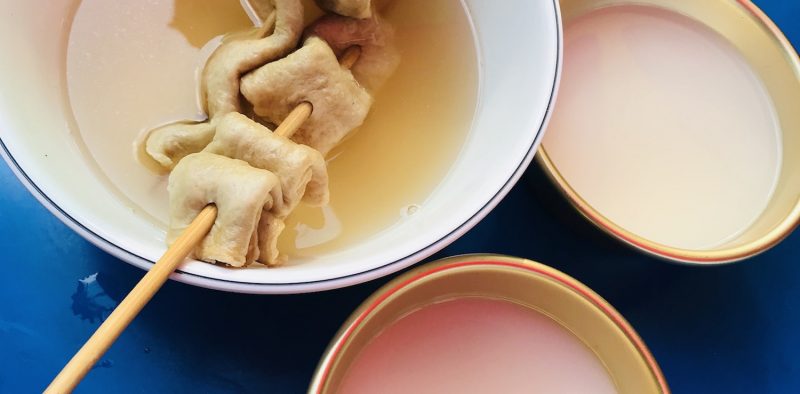
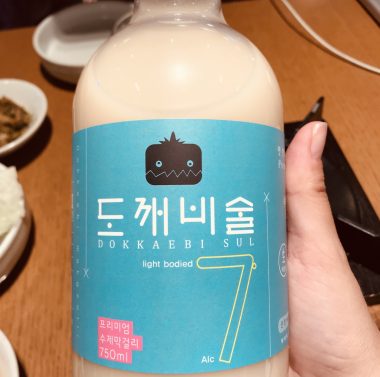

 Since 1990, people are allowed again to produce artisanal (home) makgeolli and to use rice to make it. Thirty years later, you can choose your makgeolli from thousands of brands. This rice alcohol is once again becoming popular amongst young people as numerous different flavors appeal to them. Some manufacturers, such as the famous brand Boksoondoga, make it a real luxury item that can cost over $ 100 a bottle.
The renewed interest in this ancestral drink is also in line with a new trend; the consumption of fermented food products such as kimchi, known for their benefits on gut health. Although it is an alcoholic beverage and therefore, to be consumed in moderation, makgeolli also has significant nutritional properties; it contains 2% protein, 10% fiber, 10 amino acids, vitamin C, and B. It is an excellent antioxidant, an anti-inflammatory, an immune system booster, etc.
Since 1990, people are allowed again to produce artisanal (home) makgeolli and to use rice to make it. Thirty years later, you can choose your makgeolli from thousands of brands. This rice alcohol is once again becoming popular amongst young people as numerous different flavors appeal to them. Some manufacturers, such as the famous brand Boksoondoga, make it a real luxury item that can cost over $ 100 a bottle.
The renewed interest in this ancestral drink is also in line with a new trend; the consumption of fermented food products such as kimchi, known for their benefits on gut health. Although it is an alcoholic beverage and therefore, to be consumed in moderation, makgeolli also has significant nutritional properties; it contains 2% protein, 10% fiber, 10 amino acids, vitamin C, and B. It is an excellent antioxidant, an anti-inflammatory, an immune system booster, etc.
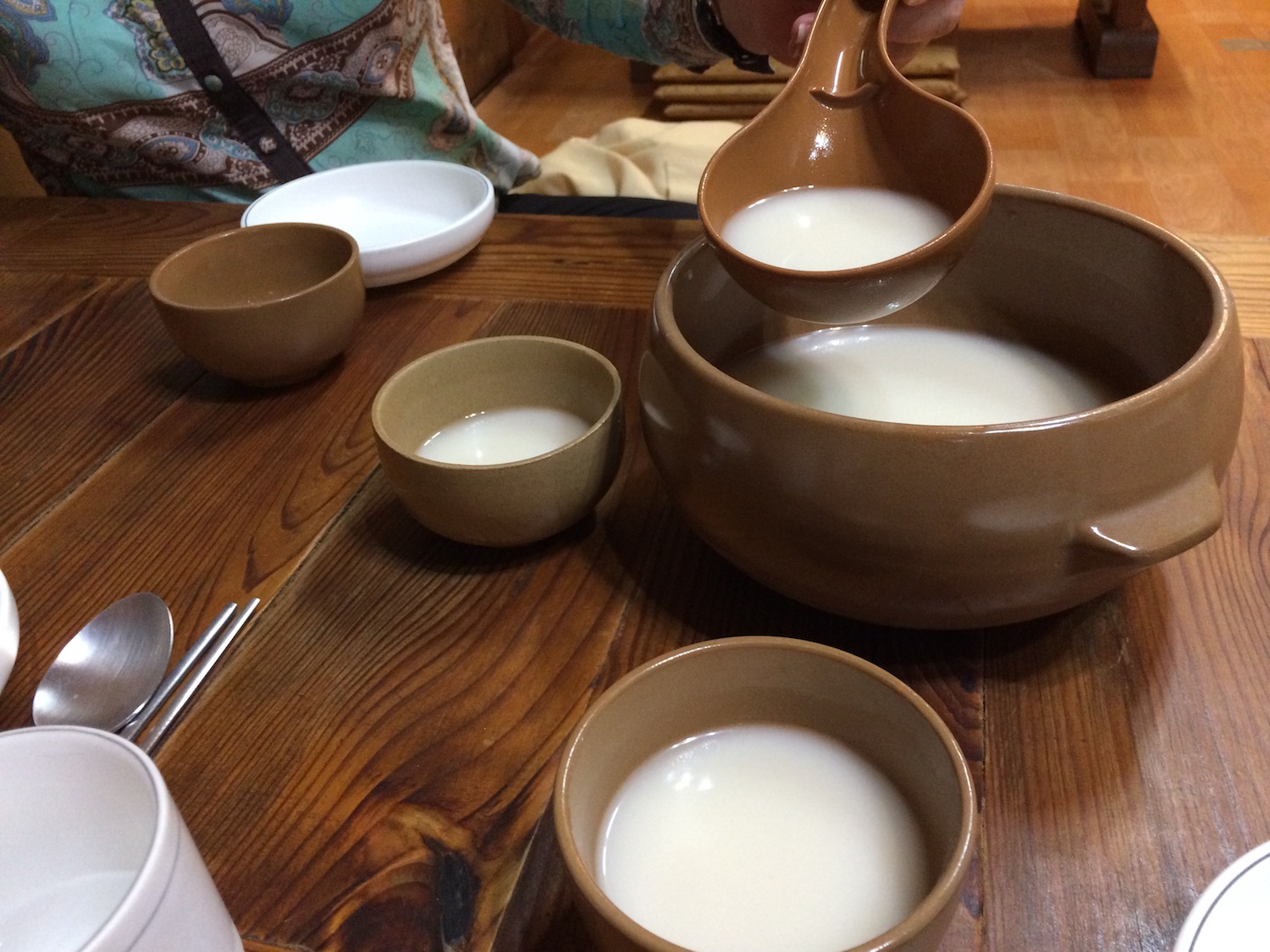
Celebrating Korean traditions
By offering us a «made in Quebec» makgeolli, Carol Duplain is tackling a Korean culinary treasure and his product will undoubtedly be noticed, if only out of curiosity, because there are not many foreign brewers producing this rice alcohol. In North America, only two brands, Hana in Brooklyn and Makku in California, offer it. Carol loves Korea and its cuisine. He enjoyed his trips there and the people he had the good fortune to meet. He visited several cities (Jeonju, Seoul, Yeosu, Pyeongtaek, etc.) known for their alcohol and tasted more than 50 different brands to get an idea of the product he wanted to offer. This project is two years endeavor of research, testing, and tasting to get to the end product his company will soon market under the name Geonbae. For its manufacture, everything has been done to respect the Korean artisanal tradition. Nuruk, made from natural wheat-based ferments, is made in-house. No sweetener nor added sugar have been put into the preparation. On the other hand, it will be pasteurized to keep it longer. But after several conclusive tests, the brewer assures that this will, in no way, affect the product’s qualities. Korean makgeolli is considered high-quality when the rice is fermented three times. Geonbae rice wine is known as sayangju which means that it will be fermented a fourth time during the production course that takes about a month.
The Quebec makgeolli will have 11.5% alcohol, and be presented in a 500 cl glass bottle. First, it will be available at several retailers in Montreal and Quebec, but Vrooden hopes to make it available elsewhere in Quebec and Canada, especially where the Korean community is important. Labeling will be done in three languages: French, English, and Korean.
According to its creator, Geonbae makgeolli has nice acidity and a floral, thirst-quenching taste. I don’t know about you, but I can’t wait to taste it! ;-P
This just in and it couldn’t have been better timing! We just learned that makgeolli, as a form of popular culture, has been designated as National Intangible Cultural Heritage!
For its manufacture, everything has been done to respect the Korean artisanal tradition. Nuruk, made from natural wheat-based ferments, is made in-house. No sweetener nor added sugar have been put into the preparation. On the other hand, it will be pasteurized to keep it longer. But after several conclusive tests, the brewer assures that this will, in no way, affect the product’s qualities. Korean makgeolli is considered high-quality when the rice is fermented three times. Geonbae rice wine is known as sayangju which means that it will be fermented a fourth time during the production course that takes about a month.
The Quebec makgeolli will have 11.5% alcohol, and be presented in a 500 cl glass bottle. First, it will be available at several retailers in Montreal and Quebec, but Vrooden hopes to make it available elsewhere in Quebec and Canada, especially where the Korean community is important. Labeling will be done in three languages: French, English, and Korean.
According to its creator, Geonbae makgeolli has nice acidity and a floral, thirst-quenching taste. I don’t know about you, but I can’t wait to taste it! ;-P
This just in and it couldn’t have been better timing! We just learned that makgeolli, as a form of popular culture, has been designated as National Intangible Cultural Heritage!
Cheers, tchin-tchin, Geonbae (건배)
References Burgerabroad.com Research gate Forbes Latimes